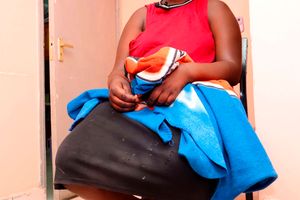
It's even worrying given that the violators, according to the studies, cut across all social classes.
Children with intellectual disabilities in Kenya are increasingly falling victim to online grooming, sexting, and sexual exploitation, a new study reveals.
The study titled Understanding Online Sexual Exploitation and Abuse of Children with Intellectual Disabilities has uncovered disturbing patterns of pornography exposure, affecting children with autism, cerebral palsy, Down Syndrome, epilepsy, and other conditions.
“Many children with intellectual disabilities will not realise that they are viewing harmful material or that they are being groomed or live-streamed,” said Beatrice Jane, executive director at ZanaAfrica, which co-authored the report, “this is because they are often denied access to life skills, online safety education, and sex and relationships knowledge.”

A new study by ZanaAfrica reveals that children with intellectual disabilities in Kenya are increasingly susceptible to online grooming.
Despite the severity of the issue, few cases are reported to authorities, and even fewer offenders are held accountable. Experts are now calling for legal and educational reforms to protect children with disabilities from online abuse.
“At first, they [the children] will be told it’s okay to touch yourself, and it is okay to touch me… the next thing, show me this, show me that and within no time that child is full-blown sexually abused. You, as a parent, will just be there, not knowing a thing. You might not realise that a child was groomed since he or she was five years old, and by the time he/she gets to 10 years, he/she will have been sexually abused,” one parent, among those interviewed in Nairobi and Kiambu counties for the study, said.
In one case, a headteacher said, “A girl with intellectual disabilities was sexually molested by an online ‘friend’. The boy took advantage of the girl due to her trusting nature and inability to read social cues, and he would ask her to stream sexual content as well as send nude pictures. The mother of the girl is so devastated.”
“We have a case of a girl with intellectual disabilities who was molested and is now pregnant. It all began with exchanging nude photos via WhatsApp and later on a physical meeting,” another teacher interviewed for the study said.
Online sexual exploitation and abuse come in many ways, for instance, through chatting or on a video call.
A youth, aged between 19 and 22 years and interviewed for the study, said, “anonymous people send you photos of their nude bodies mainly via Facebook and Instagram… Then they request you to send them nude photos too, but I have never sent any.”
“Once, when my friend and I were playing a game on the internet, a stranger who we had not met joined our game and said he wanted to play with us. After playing for a few minutes, he said there was something he wanted to show us and that we should not tell anyone. He then went into a room with a girl, and they removed their clothes, and he told us not to tell anyone,” said a child living with intellectual disability.
Some children and youth manage the risk of in-person abuse through avoidance. “People online ask me to meet them… I don’t meet them…I tell them that I am not in Kenya…I lie that I’m at work in Saudi Arabia or Germany,” said a youth living with intellectual disability. “There was a day I was home chatting with friends on TikTok, then there was this stranger we had chatted with for a few days. He asked me to give him the house number and the location where I stayed. But I lied to him that I stay in Kileleshwa, but we stay in Kiambu,” said another child.
However, not everyone is aware of the possible danger. “I met an online friend and we have been talking for almost four years. We have been exchanging pictures, and next Saturday we will be meeting in person. “I believe the blood of Jesus will protect me,” she said.
Josephine Kisilu, the Dean of Studies at the Kenya Institute of Special Education, said the trend is even more worrying given that the violators, according to the studies, cut across all social classes.

It's even worrying given that the violators, according to the studies, cut across all social classes.
Offered money or gifts in return for sexual images
According to another research done in Kenya, dubbed Disrupting Harm, 67 percent of children aged 12 to 17 years in Kenya are internet users. Of the internet-using children, seven percent had been offered money or gifts in return for sexual images or videos of themselves, and three percent had been threatened or blackmailed online to engage in sexual activities.
Threats and requests like these are made to both boys and girls and are even common in children with intellectual disabilities because they lack the vocabulary to identify these violations, much less the confidence to report due to the shame they feel, the report by ZanaAfrica, which helps girls in Kenya safely navigate puberty and unlock their potential, noted.
The report reveals that TikTok, YouTube, WhatsApp, and Facebook were found to pose high risks for exposure to grooming, explicit content, and online scams for children with intellectual disabilities.

Some 18 million children in Kenya are already exposed to online risks.
Because these children are innocent, they may not be quick to notice that they are being lured into something bad.
“They can be lured into sexual abuse, even verbal, and it’s because most of them cannot express themselves the way we are expressing ourselves. You see, someone can just say hi, and they respond. Then this person reaches a point and starts asking what type of person they are talking to, and they start abusing them, even sending them photos, and the child will start being interested and say “wow”, so the person thinks they are enjoying what they sent them, yet they don’t know the type of person they are dealing with, so it’s easy to abuse them,” said a teacher.
Some children with intellectual disabilities are not just victims of external predators—they are also exploited by peers who use their trust and innocence to their advantage.
“I have two sons; one of them, who is 20 years old, has autism, but you wouldn’t know just by looking at him. You find that at their age, they have many friends, both girls and boys. He doesn’t have a phone, but they watch movies and music at their friend’s place. Because his friends don’t want to carry the flash disk around, they tell him to carry it. I went and checked the pockets of my son’s clothes and found it. When I played the flash disk, I found it had pornography. When I asked whose it was, he didn’t want to say until I threatened him that I would burn it. It is then that he told me it was for so-and-so,” said one parent.
Megan White Mukuria, the founder of ZanaAfrica, said, “Some 18 million children in Kenya are already exposed to online risks. Let’s prepare now – before scale becomes crisis.” ZanaAfrica recommends creating nationwide awareness campaigns on online sexual exploitation and abuse; educating parents and caregivers to protect children online; and developing laws and policies on online exploitation and abuse.







